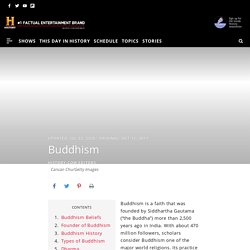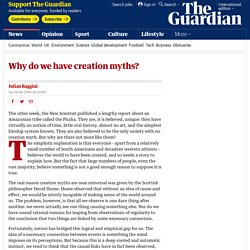

Islam. Judaism: Founder, Beliefs & Facts. Judaism is the world’s oldest monotheistic religion, dating back nearly 4,000 years.

Followers of Judaism believe in one God who revealed himself through ancient prophets. The history of Judaism is essential to understanding the Jewish faith, which has a rich heritage of law, culture and tradition. Judaism Beliefs Jewish people believe there’s only one God who has established a covenant—or special agreement—with them. Their God communicates to believers through prophets and rewards good deeds while also punishing evil. Most Jews (with the exception of a few groups) believe that their Messiah hasn’t yet come—but will one day. Jewish people worship in holy places known as synagogues, and their spiritual leaders are called rabbis. Buddhism - Definition, Founder & Origins.
Buddhism is a faith that was founded by Siddhartha Gautama (“the Buddha”) more than 2,500 years ago in India.

With about 470 million followers, scholars consider Buddhism one of the major world religions. Its practice has historically been most prominent in East and Southeast Asia, but its influence is growing in the West. Many Buddhist ideas and philosophies overlap with those of other faiths. Buddhism Beliefs Some key Buddhism beliefs include: Followers of Buddhism don’t acknowledge a supreme god or deity. Christianity - Dogma, Definition & Beliefs. Christianity is the most widely practiced religion in the world, with more than 2 billion followers.

The Christian faith centers on beliefs regarding the birth, life, death and resurrection of Jesus Christ. While it started with a small group of adherents, many historians regard the spread and adoption of Christianity throughout the world as one of the most successful spiritual missions in human history. Christianity Beliefs Some basic Christian concepts include: Christians are monotheistic, i.e., they believe there’s only one God, and he created the heavens and the earth.
Who was Jesus? Most historians believe that Jesus was a real person who was born between 2 B.C. and 7 B.C. According to the text, Jesus was born to a young Jewish virgin named Mary in the town of Bethlehem, south of Jerusalem in modern-day Palestine. Very little is known about Jesus’s childhood. Jesus was raised Jewish, and according to most scholars, he aimed to reform Judaism—not create a new religion.
Jesus’s Teachings. Hinduism - Origins, Facts & Beliefs. Hinduism is the world’s oldest religion, according to many scholars, with roots and customs dating back more than 4,000 years.

Today, with about 900 million followers, Hinduism is the third-largest religion behind Christianity and Islam. Roughly 95 percent of the world’s Hindus live in India. Because the religion has no specific founder, it’s difficult to trace its origins and history. Hinduism is unique in that it’s not a single religion but a compilation of many traditions and philosophies. Hinduism Beliefs Some basic Hindu concepts include:
Not the flesh, but the Soul - Durdy Bayramov Art Foundation. The philosophy of Stoicism - Massimo Pigliucci. YouTube. Exodus 3 NIV - Moses and the Burning Bush - Now Moses. HuffPost is now a part of Verizon Media. HuffPost is part of Verizon Media.

We and our partners will store and/or access information on your device through the use of cookies and similar technologies, to display personalised ads and content, for ad and content measurement, audience insights and product development. Your personal data that may be used Information about your device and internet connection, including your IP address Browsing and search activity while using Verizon Media websites and apps Precise location Find out more about how we use your information in our Privacy Policy and Cookie Policy. To enable Verizon Media and our partners to process your personal data select 'I agree', or select 'Manage settings' for more information and to manage your choices. The Book of Genesis, part 1: God created. Genesis 1 and 2 must be among the most hotly debated texts in the Bible.

But our obsession with whether and how they can be reconciled with scientific descriptions of the beginning of the universe is distorting our understanding of where these "creation narratives" fit into the wider concerns of the Book of Genesis. In its printed form, Genesis has 50 chapters, only one and a bit of which directly concern the origins of the universe. They are there to set the scene for what follows. Why do we have creation myths?
The other week, the New Scientist published a lengthy report about an Amazonian tribe called the Piraha.

They are, it is believed, unique: they have virtually no notion of time, little oral history, almost no art, and the simplest kinship system known. They are also believed to be the only society with no creation myth. But why are there not more like them? The simplistic explanation is that everyone - apart from a relatively small number of South Americans and decadent western atheists - believes the world to have been created, and so needs a story to explain how. But the fact that large numbers of people, even the vast majority, believe something is not a good enough reason to suppose it is true. The real reason creation myths are near universal was given by the Scottish philosopher David Hume. Fortunately, nature has bridged this logical and empirical gap for us. It is as though we are causation-greedy, preferring a bad explanation to none at all. HuffPost is now a part of Verizon Media.
HuffPost is part of Verizon Media.

We and our partners will store and/or access information on your device through the use of cookies and similar technologies, to display personalised ads and content, for ad and content measurement, audience insights and product development. Your personal data that may be used.